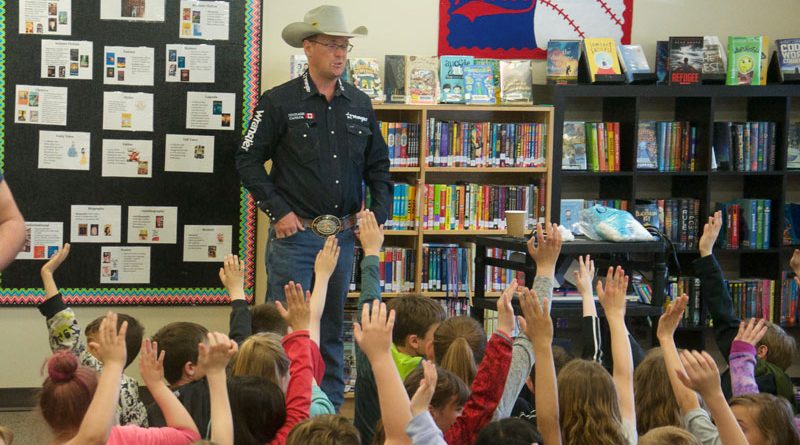Anderson shares his story with Sacred Heart students
By Tyler Lowey, Times Reporter


Tyler Lowey Photo
But now, with the medical advances made in the world of brain injuries, sometimes getting back in the saddle after a rough ride might not be the smartest decision in the long run.
That was part of the message Curtis Anderson delivered to a group of Grade 4 and 5 students at Sacred Heart Academy on May 8.
Anderson is a former bull rider whose life changed drastically after sustaining a pair of blows to the head while bull riding at the Ponoka Stampede. His injury was made exponentially worse because he was riding with a concussion that he sustained two weeks earlier during a rodeo in Innisfail.
“Any education I can provide on the consequences of brain injuries is a good thing. Now these kids can see first hand what it’s like to go through a brain injury like this. I’m living proof of what can happen and hopefully this hits home,” said Anderson.
When Anderson was injured while riding Real Handy in Ponoka June 26, 2002, he was immediately rushed to the University of Alberta hospital, where he spent three weeks in a drug-induced coma. Coming out of the coma, Anderson needed a wheelchair to get around and he wasn’t sure how much mobility he would get back.
Fast forward nearly 16 years: Anderson is now 43, can walk normally and visits schools, rodeos and other sporting events to spread his message.
“The best part about speaking to groups is that oftentimes, someone from the crowd will come up to me and have a friend or family member with a brain injury like mine,” said Anderson. “I think it’s always good to hear a survivor share their story and connect with other people out there. It can give them hope with their own recovery.”
It was a long and challenging road for Anderson to get to where he is today. It has been years of hard work rehabilitating his body and he still is very limited in what he can do with his left arm, but it’s all a part of the recovery process and he isn’t backing down from the challenge anytime soon.
Anderson put some of those skills on display in the classroom, as he can now use light switches and pick up small coins off a smooth countertop. Everyday tasks that most people take for granted aren’t as easy for him now, but he is hoping his presentation showed the importance of proper protection and rest for your brain.
“This was so valuable for him to come down and speak with the kids,” said Paulette Chotowetz, Sacred Heart Academy principal. “He comes from a real-life situation and made them aware that this could happen to any one of them if they aren’t careful.”
Concussions are a part of most sports these days and are not limited to bull riders. The students Anderson was speaking to are out riding bikes now that the weather is warmer and playing sports like soccer and hockey in winter. He wanted to make sure they all know the risks of head injuries and their lasting effects.
“A broken arm heals in about six weeks. A broken brain can take a lifetime to heal,” said Anderson, who has broken several ribs and separated a few shoulders back in his prime. “It’s important that these kids know that brain injuries take longer to heal, need more rest and more water. It’s also extremely important for them not to return to their sport until they are fully healed.”
Despite all that he has gone through, Anderson still loves the rodeo and is a cowboy at heart. The former Strathmore Stampede contestant still judges at a few rodeos and has even been back riding horses again.
Next week will kick off the 14th year of Anderson’s Courage Canada Trail Ride just outside of Vermilion. He started the annual ride as a way for cowboys and cowgirls to raise money for brain injury victims while riding outdoors in the sunshine. Last year, there were 38 riders, 20 wagons and over 300 people attended the dinner in the evening. To date, he has raised over $194,000 for different brain injury centres around Canada.
If anyone is interested in joining the ride or having Anderson come speak to a group about brain injuries, he would like them to contact his cell, at 1-780-581-4802.
